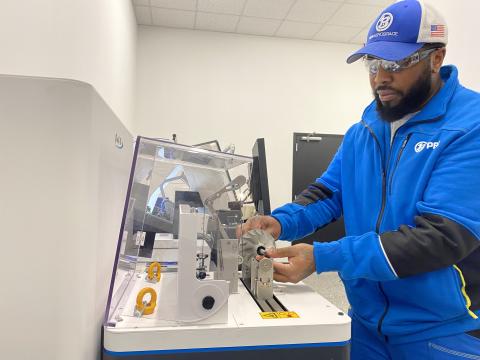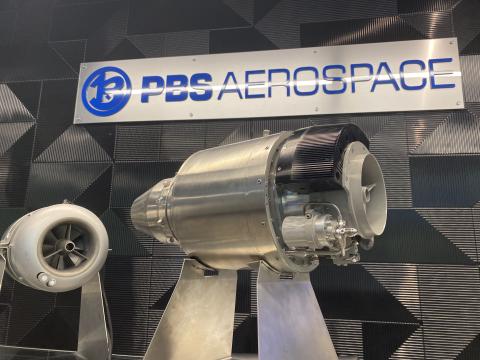A new chapter in aerospace innovation is taking flight in Georgia. PBS Aerospace, a global leader in small turbojet engines, has selected Roswell for its first U.S. manufacturing facility—drawn by Georgia Tech’s engineering expertise, a skilled talent pool, and a business climate built for speed.
Modern warfare and the technology behind it are evolving. Around the world, the skies are increasingly filled with small, agile, and intelligent systems — drones, missiles, and interceptors that demand lightweight, affordable, and highly efficient propulsion. The future of defense is fast, adaptable, and precise — and Georgia is positioning itself at the center of that transformation.
When PBS Aerospace (PBS), a global leader in small turbojet engines, began searching for a location to build its first U.S. manufacturing facility, it didn’t look to the traditional defense hubs. Instead, it chose Roswell, Georgia — where research excellence at Georgia Tech, a ready supply of high-tech talent, and a business environment built for speed are converging to create a new aerospace manufacturing cluster.
“PBS is the world’s leading producer of small turbojet engines,” said Erin Durham, CEO of PBS Aerospace. “We’re bringing those outstanding engines here to the United States to start up a U.S. factory — and we’ll be producing thousands of them by 2026.”
Unlike the multimillion-dollar cruise missiles of the past, the systems PBS supports are designed for scale and agility. Their compact engines — typically producing 100 to 200 pounds of thrust — power the small drones and missiles that have redefined defense strategy in conflicts from Eastern Europe to the Middle East. “Our engines go into munitions that cost a tenth of traditional systems,” Durham said. “That allows us to produce at a fraction of the cost, project power, and defend U.S. interests more effectively.”
To stay ahead in such a rapidly changing field, PBS turned to Georgia Tech. “Because the drone world is so innovative and so disruptive, we have to move very quickly to provide the most advanced engines possible,” Durham said. “Working with Georgia Tech on the cutting edge of disruptive technologies enables us to keep our engine designs moving forward and provide the best solutions for the U.S. Department of Defense.”
That partnership draws on Georgia Tech’s world-renowned expertise in propulsion, combustion, and systems engineering — as well as its unique ability to translate research directly into industry impact. Inside the Zinn Combustion Laboratory on Georgia Tech’s Midtown Atlanta campus, faculty and students are already working with PBS engines to refine fuel efficiency, test new materials, and optimize performance.
“There are about 50 active projects in our lab right now,” said Adam Steinberg, professor in the Daniel Guggenheim School of Aerospace Engineering. “They range from fundamental combustion science to testing real hardware used in flight. Georgia Tech provided access to one of our engine facilities while PBS was standing up its Roswell site. Georgia Tech students and PBS staff then worked hand in hand to test the first engines built in Roswell. This is a strong example of how partnerships can help accelerate industry innovation.”
For Steinberg, the collaboration represents a model for how research universities can help shape emerging industries. “When you’re building engines, you need people who know how to assemble and test them — but you also need highly skilled engineers who will push the technology into the future,” he said. “For our students, it’s an incredible hands-on experience. They’re working on systems that are shaping the next generation of propulsion.”
That talent pipeline — from research labs to manufacturing floors — is already flowing. In Roswell, Joseph Banks, a technician at PBS, helps assemble the engines that will soon power some of the world’s most advanced crewless systems. “It’s a puzzle,” Banks said. “It’s all precision work. At the end of the day, I’m happy to do it because there’s purpose behind everything we do here.”
That sense of purpose is matched by the urgency of the moment. As global demand for crewless and autonomous systems accelerates, the U.S. Department of Defense is seeking faster, more flexible production on American soil. PBS’ decision to locate in Georgia — where 99% of its supply chain will be U.S.-based — strengthens both national security and the state’s growing role in the aerospace economy.
Georgia’s pro-business environment has amplified that momentum. The City of Roswell fast-tracked PBS’ permitting process, enabling construction to begin within months, while nearby technical colleges and Georgia Tech supply the skilled workforce needed to scale. “With Georgia Tech-trained engineers, nearby tech schools, and a community that supports innovation, we have everything we need to grow,” Durham said.
For Georgia Tech, PBS’ arrival signals more than a successful partnership — it’s part of a broader strategy to ensure the state leads in the technologies that define the future of defense.
“This could be one of the largest expansions in domestic aerospace manufacturing in quite some time,” Steinberg said. “Having that here in Georgia right now, with the talent and support to make it succeed, is amazing.”
As drones and next-generation munitions reshape the nature of conflict, Georgia Tech’s research, talent, and industry partnerships are ensuring that Georgia — and the nation — stay at the forefront of innovation in the skies.
Additional Images

<p>Joseph Banks, a technician at PBS Aerospace in Roswell, places a drone part on a machine for balance testing. </p>

<p>One of the turbojet engines manufactured by PBS Aerospace. </p>
